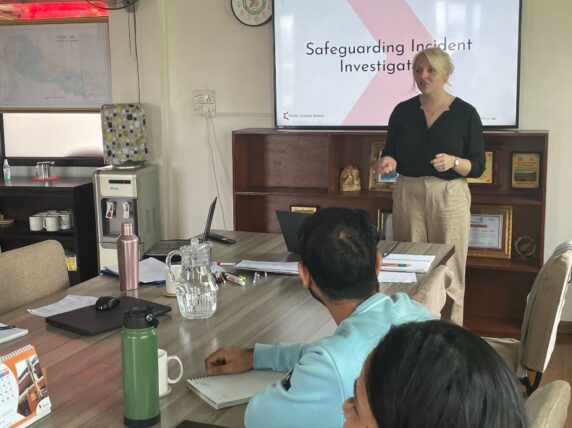NGOs have improved safeguarding, but the aid sector needs systemic change to be safer
Safeguarding in the UK NGO sector has come a long way since 2018.
Over the last two years, Bond has brought together over 800 participants at safeguarding events and trained 650 people from almost 200 organisations. We also updated and expanded our safeguarding training to help NGOs grappling with the complexities of safeguarding.
Our recent survey with members paints a similar picture of NGOs’ progress. But we still haven’t seen the systemic change the aid sector needs, as highlighted by the harrowing revelations of sexual exploitation and abuse in the DRC during the Ebola outbreak.
NGOs are making changes to keep programmes safe
95% of the 129 respondents said their confidence and knowledge of safeguarding has increased in the last year and they have applied that knowledge to their organisations. 89% of respondents have noticed improved practice within their organisations.
Respondents cited an increase in reporting, a greater awareness of an individual’s safeguarding responsibilities, more robust risk assessments and a general trend towards people speaking up about incidents.
Subscribe to our newsletter
Our weekly email newsletter, Network News, is an indispensable weekly digest of the latest updates on funding, jobs, resources, news and learning opportunities in the international development sector.
Get Network NewsNGOs are also continuing to invest heavily in safeguarding: for the third year in a row, respondents said they’ve increased their resources on safeguarding. 64% of respondents increased safeguarding resourcing, with most increasing staff time and training on safeguarding, but also budgets and board oversight. Compared with our survey last year, most organisations still have less than one full-time person working on safeguarding, but the amount of resource is increasing with more organisations having one or more full-time posts since last year.
These are all hugely positive examples of organisations addressing the short-term immediate changes needed to ensure their programmes and organisations are safe.
But we’re not there yet
Despite this progress, the NGO sector is not there yet. This week’s revelations of sexual exploitation and abuse in the DRC during the Ebola outbreak are a critical reminder that we need more transformational change to protect people from harm. It seems most progress has been made on better practices within individual organisations, rather than necessary systemic change.
We know safeguarding is complex and presents multi-layered challenges. Our survey shows many organisations grapple with similar concerns, like working well with partner organisations on safeguarding, and developing measures that are relevant, appropriate and effective in different countries or contexts.
But we also know that each organisation, programme, context or incident is unique. Each incident must be approached in a tailored way, informed and guided by the communities, victims or survivors. This approach requires continued investment from organisations. Despite NGOs increasing budgets and staff time on safeguarding, many told us that resources are tight: they need more funding to effectively implement and embed safeguarding across all programmes and at all times.
Other challenges are even less tangible. It’s difficult to measure the following:
- developing and maintaining healthy organisational cultures that build trust, and encouraging speaking up.
- having confidence that an organisation can prevent incidents from happening.
- having the expertise to respond sensitively and compassionately when an incident occurs.
- being sure that the systems and practices we have developed – and are constantly improving – function well.
Reporting numbers don’t give an indication of where we really are. Even a small number of responses to the Bond survey indicated that larger organisations have higher case numbers than smaller ones. Organisations also still suspect under-reporting and no cases doesn’t equal no incidents.
What we still need for a safer aid sector
It is too simplistic and optimistic to think we’ll be able to stamp out abuse across the aid sector by only continuing to change how UK NGOs work or by learning from experience, although these are essential starting points.
To effect real change across the aid sector, we need strong leadership to shift organisational cultures and fully-resourced interventions to tackle power imbalances head-on. We also need more diversity across organisations, including more women in positions of power.
Perpetrators must be kept out of our sector. The misconduct disclosure scheme improves referencing and helps ensure abusers can’t move freely between organisations. But more is needed: disclosure and disbarring checks should be extended to frontline aid workers, and we need better checks available internationally.
It is good to see the new Foreign Commonwealth and Development Office’s commitment to safeguarding and preventing sexual exploitation, abuse and harassment. This commitment is also reflected in the UK government’s overall safeguarding strategy, which emphasises providing global leadership, long-term sustainable change and shifting cultures.
But we need to push for sector-wide change, beyond individual NGOs, that is survivor-centred, well-resourced and adequately funded.
Find out more about our work supporting organisations to prevent sexual exploitation, abuse and harassment across the international development sector.
Category
News & ViewsThemes
Safeguarding



